Are You An INFJ or an INFP? How to Find Out!
“Am I an INFP or an INFJ?” This is a question I get every day as an MBTI® practitioner and blogger.
The reason this question comes up so frequently is because there are so many unreliable online tests out there. These knock-off personality quizzes claim to be as accurate as the official Myers-Briggs Type Indicator®, but they are lacking the reliability and validity testing that went into the official MBTI®. As a result, numerous people are being mistyped or getting different results each time they take the test. The most common mistype to come from these online tests is the INFP/INFJ mistype.

Estimated reading time: 8 minutes
Take my INFJ or INFP Test! Scroll Down After Taking the Test to Read the Rest of the Article
Why are so many INFPs and INFJs mistyped?
The majority of online tests focus on the letter dichotomies (E or I, S or N, F or T) without considering the cognitive functions. Because of this, a very slight preference towards the P dichotomy or the J dichotomy could change your entire type. This isn’t how personality typing should work.
INFJs and INFPs share zero cognitive functions. Cognitive functions are like mental tools that you have at your disposal at all times. We all use different tools more readily, and with different levels of aptitude.
Are you confused yet? Let’s try to simplify things!
Let’s start by taking a look at the different cognitive functions for the INFJ and the INFP.
INFJ Functions:

INFP Functions

If you look closely, you can see that the INFJ uses introverted intuition (Ni), extraverted feeling (Fe), introverted thinking (Ti), and extraverted sensing (Se). The INFP uses introverted feeling (Fi), extraverted intuition (Ne), introverted sensing (Si), and extraverted thinking (Te).
In short, there is not one function that these two types share.
How can I tell if I’m an INFP or an INFJ?
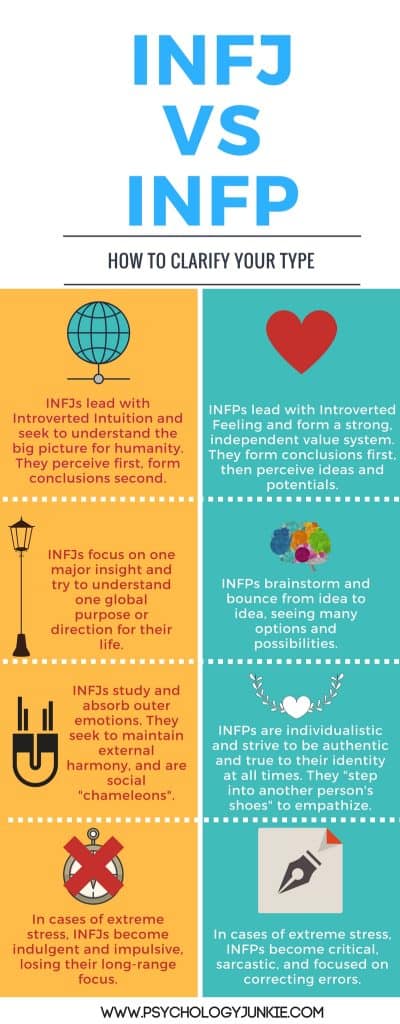
How INFPs and INFJs Use Intuition
INFJs lead with introverted intuition. This is their dominant function. Their #1 favorite driver. They use it so much that they probably don’t even realize they are using it.
More than anything else in the world, INFJs are going to look at patterns, perspectives, and the big picture.
They privately consider the purpose and meaning of life, and analyze human patterns and behaviors. They like to discard possibilities until they come to the one most likely possibility for the future.
For the INFJ, finding “the one” idea is the goal.
INFPs use Extraverted intuition. Rather than looking for the “one” idea, INFPs enjoy navigating dozens of ideas and possibilities. Their minds generate imaginative connections, futures, scenarios, and dreams on the fly. There’s a wish to expand possibilities rather than to narrow them down.
Unlike the INFJ, who focuses on discarding possibilities until the right one is reached, an INFP adds MORE possibilities to the picture.
They can see one thing and extrapolate numerous ideas and connections from that one thing. Brainstorming and bouncing from idea to idea is natural to them. Their intuition is like a tree with short roots but broad branches reaching out in many different directions. It has lots of breadth, and extrapolates many connections.
How INFJs and INFPs Use Feeling
INFJs use Extraverted Feeling. This is their 2nd favorite, or auxiliary function. It balances out their intuition. INFJs notice and absorb the moods and emotions of the people around them. They usually know how to alter their behavior to make everyone feel good. Smiling, laughing, getting into a “vibe” with someone else; this is something that comes naturally to them.
INFJs are often called “social chameleons” because they can so easily adjust to the people around them. In fact, some INFJs risk losing themselves in the aura of the people around them, forgetting their own individual sense of self.
For the INFJ, external harmony is key. There’s a natural tendency to adjust to others.
INFPs use Introverted Feeling (Fi). This is their favorite function, the one they use without having to try.
INFPs constantly analyze how things fit in with their value system. What feels right to them? What matters to them? What do they stand for, even when everyone else is going a different direction?
INFPs are individualistic and autonomous. They don’t want to be influenced by the external “mood”.
For the INFP, inner harmony is key. There is a natural tendency to march to the beat of their own drum and not change or “chameleon” for others.
INFPs are constantly in check with their conscience to determine if something is “right” or “wrong.” They step into other people’s shoes to try to understand how they would feel in their position. This is called “mirroring” emotions.
INFPs will rarely alter their ideals or identity to “smooth over” things in the outer environment. Internal harmony and authenticity will always be more of a priority than external harmony.
How INFJs Use Thinking
INFJs care about things making sense in their own minds. While on the outside they can seem empathetic and friendly, inside they have a more skeptical, analytical side.
For INFJs, logical consistency is important and they can easily play devil’s advocate if they’re around people who won’t take offense to it.
Categorizing and sorting out information is a lot of fun for INFJs! They enjoy understanding the principles and underlying frameworks of how ideas and theories work. They learn for the sake of learning; but they don’t typically feel comfortable “talking out” their logic with others, because they worry that it will seem critical or their thoughts won’t be refined or accurate enough.
How INFPs Use Thinking
INFPs use Extraverted Thinking, but it’s in the inferior position for them. Extraverted Thinking focuses on externalizing logic to make sense of things, or organizing the outer world to achieve a specific goal.
INFPs like the idea of to-do lists, goals, and organizing the world around them in a way that makes sense. But they tend to feel uncomfortable doing it. Instead, priority is given to the world of Feeling and Intuition; values, ideals, imagination, exploration, conviction.
As INFPs age and mature, they tend to become more proficient with Extraverted Thinking. They become more effective at giving constructive criticism, offering logical advice, or organizing their world in a productive way. But this usually takes time and practice and they will feel tired afterwards, like they’ve just expended a lot of mental energy.
During moments of stress, INFPs may fall into the grip of Extraverted Thinking and become more critical, bossy, and focused on organizing and “fixing” everything in their environment.
How INFJs Use Sensing
INFJs use a process called Extraverted Sensing, or “Se” for short. Extraverted Sensing is all about acknowledging what’s tangible and relevant, rather than trying to figure out what’s going on beneath the surface.
Because Se is inferior for INFJs, it tends to take a backseat. They can easily feel overwhelmed by noise, sights, sounds, tastes, and textures. The concrete realities of life sometimes feel suffocating, particularly when compared to the compelling world of intuition.
With age and maturity, INFJs become more proficient with Extraverted Sensing. They become more effective at handling details, reacting to spontaneous events, and enjoying the moment rather than fixating on the future.
During extreme stress, INFJs may fall into the grip of Extraverted Sensing. When this happens, they become more impulsive, pleasure-seeking, and hedonistic. They may shop carelessly, overeat, over-exercise, lose their temper, or do something else in an impulsive burst of energy that they wouldn’t normally do.
How INFPs Use Sensing
INFPs use a process called Introverted Sensing, or “Si” for short. This function is all about tuning into the past, in all its personal nuance, and using the memories to instill something significant or helpful into the present moment.
When INFPs use Introverted Sensing they reminisce, recall age-old wisdom, or revel in routines and traditions that give them a sense of groundedness.
Introverted Sensing is a valued function for INFPs. They tend to have a playful, creative, childlike energy with it. They may enjoy commemorating their memories in creative ways; through specific playlists, poetry, scrapbooking, songs, or artwork. They may also develop special feel-good routines that comfort them during difficult moments.
Receiving love and support in the world of Introverted Sensing is crucial for INFPs. It means a lot to them when others value and honor their traditions or routines or take an interest in their stories or life experiences.
What Do You Think?
I hope this helps you to understand the real differences between the INFP and INFJ! I also hope this helps you to figure out if you are one of these types. If you’re still unsure what your personality type is, you can take my INFP or INFJ questionnaire here.
Tap into even more discoveries of your personality type in our eBooks, Discovering You: Unlocking the Power of Personality Type, The INFJ – Understanding the Mystic, The INTJ – Understanding the Strategist, and The INFP – Understanding the Dreamer. You can also connect with me via Facebook, Instagram, or Twitter!
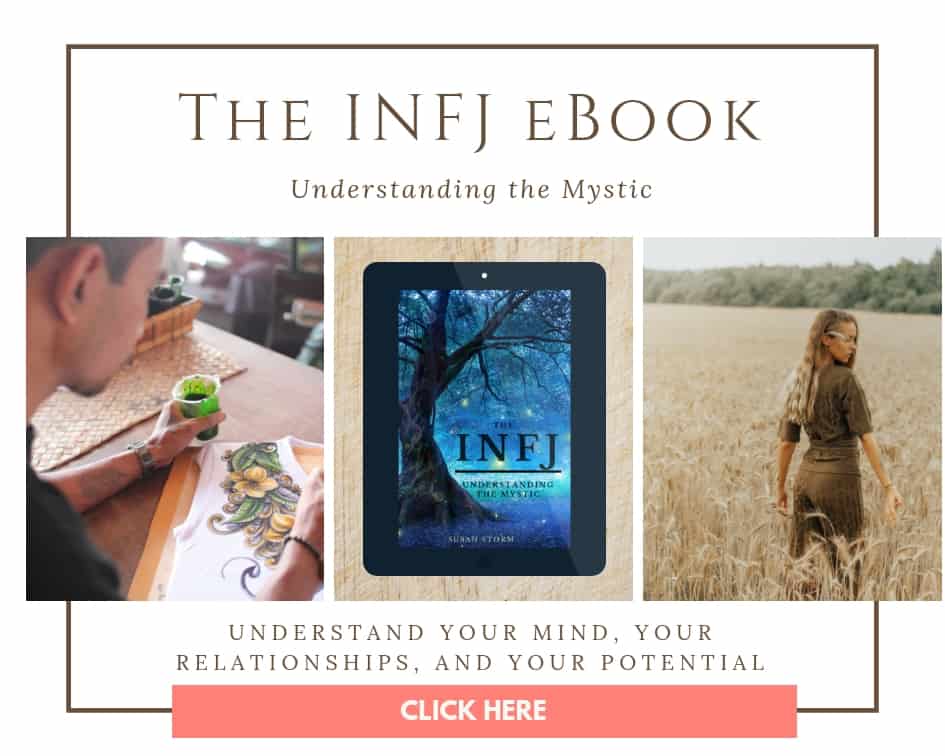
Sources:
There is a lot of helpful information about these two types if you are still seeking clarification. Check out these links!
References:
Building Blocks of Personality Type by Leona Haas and Mark Hunziker (2006, Eltanin Publishing)
Understanding Yourself and Others® An Introduction to the Personality Type Code by Linda V. Berens and Dario Nardi (InterStrength, 2004)

Get Your Free INFJ eBook
As a thank you for subscribing to my newsletter I will send you this free eBook PACKED with self-care tips, creativity hacks, and more! You'll also get a 3-day email course for understanding your personality type better!


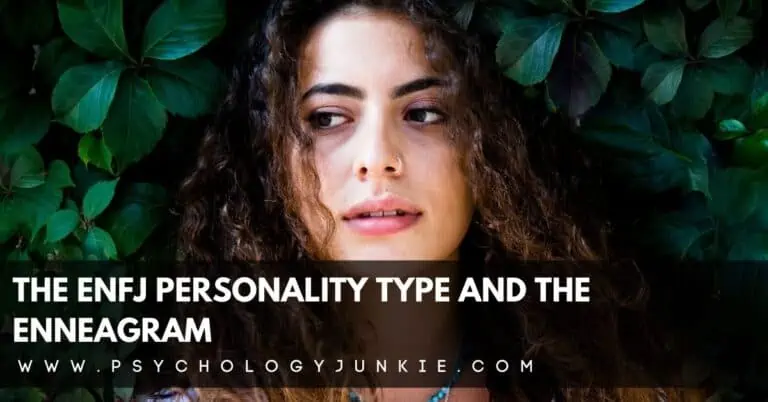
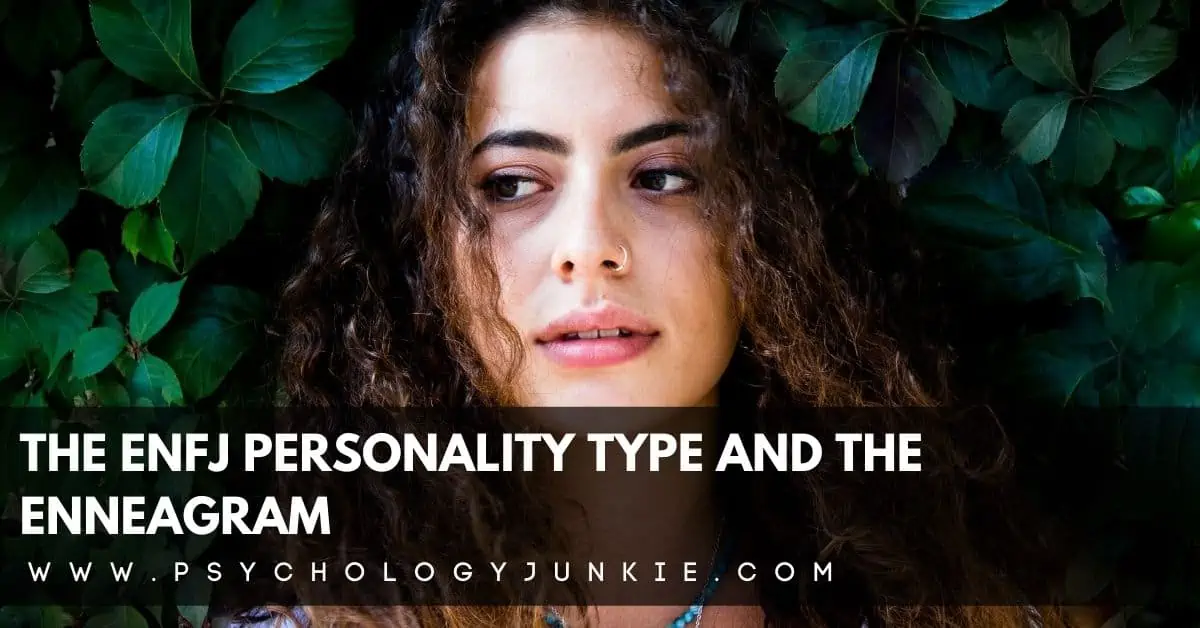




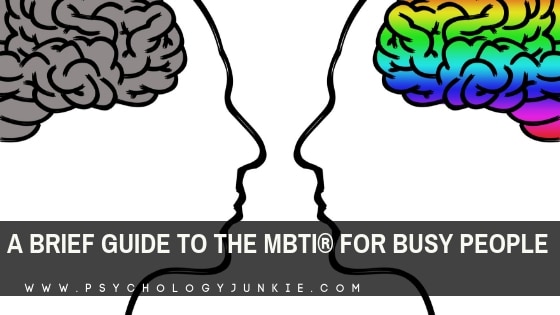
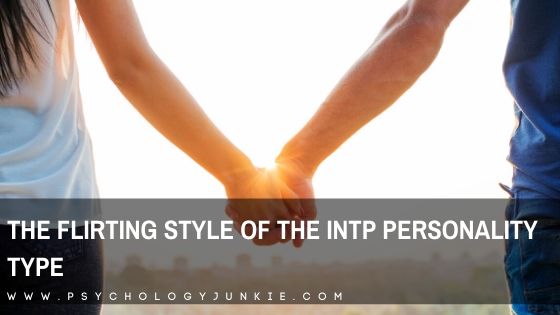


After reading this, I am think I am INFJ But I almost always test INFP . That being said I relate more to what I read about INFJ. I’m still confused.
lol
I test INFJ and INFP interchangably. It’s almost like my mood of the day changes my test outcome. This article confused me more as well. I identified more with INFP in a couple of paragraphs and more with INFJ in others. I am terribly confused.
Your experience is mine as well, from the interchangeable testing as well as relating in this article. I’m beginning to think that we may be an even more rare 17th type the INFC (confused) lol.
I second this!
Well it definitely helped clarify the difference between the two types, but it didn’t help me definitively place myself in either. ???? I can see myself clearly in each example, and I have specific experiences come to mind as I read the traits of both types! Can someone be both/neither/squarely in the middle?
If you’re in the middle, you might be overthinking things OR neither would be the right match. Check out ISFJ and ISFP and see if either fits you better
Same. I still can’t tell. I took the test and got INFP then read through it and mostly related it INFJ
On Personality Hacker I mistyped as INFJ, and subscribed to your blog as an INFJ. I’m an INFP. How do I resubscribe to your blog as an INFP?
Hi Macrina! I’ll look you up in our email system and see if I can get you onto the right list 🙂
first test i did i was an infp recent test i did said im an infj like my mother but after reading this im pritty sure im an infp. lol
I got exactly 50% for each INFJ and INFP in the test… Please help?
Me too and I struggled with a lot because most were both
I took this test and scored a 50% / 50% … Well. That doesn’t exactly help me.
I scored a 50/50 on the test… that didn’t help. But this was a very informative article that was enjoyable to read nonetheless.
I’ve been tested as a INFP but after reading this article and studying the difference between the two..I Resonate with both types..is it possible that a person can be both types..confused
For anyone confused about these types please focus on understanding the lead functions!
If you feel deeply about things unconsciously always, feelings are super loud and can’t be shutdown, probably you are Fi dominant, if you find the external world feeds your intuition more so than it coming from inside you. If your feelings are louder than the intuitive leads you get you are most likely FiNe
If you are constantly looking for patterns and connections without even noticing, when someone tells you something it relates to this and that and thus means x thing will happen and you have to soften your predictions according to how ready for them you actually feel the other person is, if the external world feeds you feelings, you are most likely NiFe
This types share no functions, understanding the functions is of upmost importance!
Infj
External world feeds them feelings, Inner world insight, patterns and connections to an absolute understanding of reality, how do I feel about this is something you have to consciously decide to consult, what others feel and what should be done is always there and you can always feel it, a person is next to you, you literally feel what they are feeling and stopping it is a conscious choice.
Infp
External world feeds you insights, Inner world feelings, feelings that shape how you perceive the world, how do I feel about this represents no effort, it just happens, if you project your imagination in a way you can actually feel the other person you can feel what the other person is feeling, a conscious choice
Cyclical summary
Infp In to out: feelings out to in: insights, empathy: a conscious choice Listening to your feelings: a subconscious permanent happening
Infj in to out: insights out to in: feelings
Empathy a subconscious permanent happening, Listening to own feelings: A conscious choice
Hope this helps someone~ !!!
Thanks, that helped me a little bit! Well, I think you made it very clear. It certainly helps a lot of people, it’s just that in the first few functions I felt like INFP, but the more I got into it the more I thought I was thinking like INFJ.
Here is a little summary of my situation (you don’t have to read it, I know it’s boring xD)
The first time I did an mbti test, I got INFP (with 1% difference with INFJ) But I had doubts, and I did it again later. I got INFJ with still 1% difference with INFP… Then now I’m an INFP again. So, of course, I had done some research myself to make sure the test was reliable, and I read all the types myself, because I don’t like to say “I am such and such a type” just by taking a test that I may have answered wrong (because of comprehension concerns, or maybe honesty). I deduced that I act more like an INFP, that I have morals and feelings more like an INFP, but that in my relationship with others (I am often forced to) I am more like an INFJ. Also, my sense of empathy is more like INFJ, and my values and understanding of the world more like INFP. I allowed myself to say that I was between the two, but here it is, it stresses me out, so I’m still there ;-; (which also makes me closer to INFJ because I hate spontaneity, it stresses me out a lot, but I feel like I’m “lazy” and not trying hard enough. I am very apprehensive and I am by nature stressed and pessimistic, and individualistic. I have a strong sense of morality but I am also an emotional sponge that is easily manipulated in that sense.
Namely, in both cases I am a 100% Turbulent type.
If you can help me, it would be very nice 😀
(btw sorry for the automatic smiley-)
Did I get it right ?
INFJ inner world feeds them insights , outerworld feelings
INFP innerworld feeds them feelings, outworld insights
did IIIIII?
Yes! Perfect 🙂
Wow! Thank you. I have always felt like such a bad INFP with my flexible morals and inability to figure out my feelings. INFJ explains it all!
I really think I need someone older to explain this in a way I understand. I don’t understand the way you word things. My Gen X brain tends to perceive info better when it’s coming from someone my own age. For example, “INFP in to out: feelings out to in” doesn’t make sense to me. It’s reads as gobbledygook. I want to be polite, but I can’t say “no offense” or “not to be rude” or whatever because that’s interpreted as the opposite. Basically I’m trying to tactfully say “thank you for the effort, but your explanations aren’t helpful for me”.